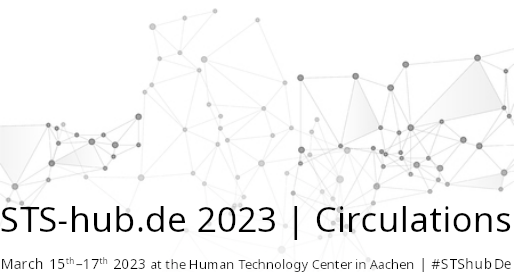The Automating the Logistical City project team is organizing a panel on “Circulation Obsession – Following the Flows and Flaws of Big Tech’s Urban Logistical Infrastructures” at the sts-hub in Aachen this March 15-17, 2023. We’re excited to be in conversation with our guests Sarrah Kassem (Universität Tübingen) and Valentin Niebler (Humboldt Universität Berlin).
You can find the abstracts of the panel below and more information on the conference including the program here.
Panel abstract:
From city streets to screens, server farms to services, Amazon has – in recent years – woven a tight, invisible, but nevertheless ubiquitous web of technologies, circulating products – parcels -, knowledge, expertise in a seemingly never ending global flow dedicated to their “distribution fetishism” (West 2022). Through networked (urban) technologies like Ring or Sidewalk Pro or the limited algorithmic architectures of Amazon Alexa, offering – on the surface – limitless customer choices, it has not only turned the city into its extended (logistical) living room. On the (literal) back of a human pipeline of disposable bodies, Amazon has become infrastructural. Under the cloak of convenient connectivity and by gradually taking over logistical and postal operations; the provision of essential needs; as well as great parts of the global internet infrastructure through their Amazon Web Services it is already invisibly, but ubiquitously governmentally powerful, and often perceived as indispensable – a standard. Bodies and cities alike, here, become a warehouse of data, freely accessible and extractible at Amazon’s fingertips. In this data-determined Amazon town, the city is a predefined playground for “consumer citizens” (Powell 2021) to be ‘nudged’ around, but not thought about.
Big tech companies’ techno-solutionism has, especially in times of crises, offered convenient services of all sorts (from cloud solutions, over urban governing tools, to home services) to preclude possible future frictions, speculating on a more homogenous, ‘harmonized’ networked city. In times of an uprising and shrinking (gig) workforce and increasingly unpredictable supply chains, however, the question arises how much further corporations like Amazon are able to expand their worldwide cycle of circulation in cities and their hinterlands. Already, (re-)occurring and fatal glitches, failures, and breakdowns of their system – preventable deaths in autonomous driving trials; implementing anti-union practices; unbearable physical and psychological pressure in hostile workplaces – have not only fueled collective workers organization, but the public expression of fighting for otherwise socio-technical imaginaries. How are these finely curated and controlled circulations by monopolized “infrastructural elites” (Tonkiss 2015) upheld and maintained – and by whom? What do alternative, resistive networks and decentralized drafts of anti-automated futures look like?
In this closed panel discussion and together with our selected guests, our research project “Automating the Logistical City” wants to ethnographically follow the flows and flaws of big tech companies’ imaginaries around future ideas of (urban-logistical) circulation. From test-beds over patents to counter-speculations we aim to analyze the disposition and propensities, affordances and agency that corporate technologies carry with them. How are narratives of future circulation negotiated, translated to, and operationalized in the now? And what happens when the cycle of Big Tech’s monopolized (municipal) power breaks?
Literature:
Powell, Alison B. (2021): Undoing Optimization: Civic Action in Smart Cities. New Haven and London: Yale University Press.
Tonkiss, Fran (2015): Afterword: Economies of infrastructure. In: City 19/2–3, pp. 384–391.
West, Emily (2022): Buy now: How Amazon Branded Convenience and Normalized Monopoly. Cambridge: The MIT Press.
Contributions:
‘Work and Alienation in the Platform Economy: Amazon and the Power of Organization’ (research based on the book by the same title, published at Bristol University Press, 2023)’ by Sarrah Kassem (Eberhard Karls Universität Tübingen)
Once hidden behind the veils of entrepreneurship, it is now clear that platforms are reshaping the world of work, and Amazon has been a forerunner in setting the trend. This book examines two key and contrasting Amazon platforms that differ in how they organize workers: its e-commerce platform and digital labor platform (Mechanical Turk). With access to the people who are working at the heart of these platforms, it explores how different working conditions alienate workers, and how, despite these conditions, workers organize within their political-economic contexts to express their agency in traditional and alternative ways.
‘Joint Forces? Coalition-Building against Tech Corporations’ by Valentin Niebler (Humboldt University Berlin)
Collective action in the tech industry has become widely recognized today. Although both low paid ‘gig workers’ and higher paid ‘tech workers’ have launched organizing efforts, their mobilizations often appear as separate causes. My presentation introduces a case where both groups join forces. Based on empirical data from Berlin, I analyze how gig workers and tech workers have generated ‘coalitional power’ vis-à-vis a delivery tech company. I argue that coalitions between gig workers and tech workers are possible, especially if both groups can refer to shared conflicts lines. I emphasize the role of migration as a conflict line and the role of the city as a site of cooperation for such coalitions.
‘Speculating on the Sidewalk – Interrogating Amazon’s Infrastructures in the Logistical City’ by Maja-Lee Voigt (Leuphana Universität Lüneburg) and Armin Beverungen (Leuphana Universität Lüneburg)
Sidewalks and smart homes alike have long become an assembly line for tech giants like Amazon collecting consumer data and labor. Invisibly entangled in the most intimate spheres of our everyday life and feeding on the tech-induced insecurities of its users, Amazon is finely curating a web of preemptive choices, and thus, certainties to profit from. As Amazon promotes and implements its Sidewalk technology as an operational standard for convenient connectivity while it sells its smart gadgets which connect through it, Amazon gains infrastructural power. Our presentation asks which modes of governance and citizenship will emerge from the pervasive intermediation of proprietary and profit-driven algorithms. What will increasingly automated decisions about infrastructure usage, circulation, security, and sociality look like in the future? And how are they already influencing cities today?
